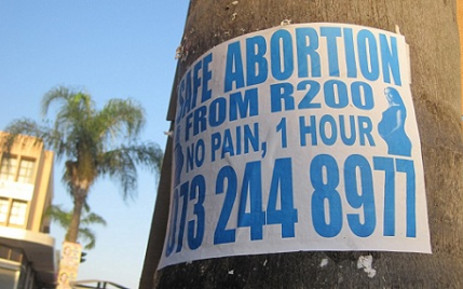
Out of 12 healthcare centres, only three would help us. And out of 12 backstreet providers, all but four were reachable.

JOHANNESBURG – Alice* (not her real name) had an illegal abortion when she was 13-years-old.
She approached three different facilities looking for help and was told by staff at each that she needed a parent to accompany her. This was out of the question – there wasn’t “any way”, she said. So she, instead, made an appointment with a backstreet abortion provider whose number she found on a flyer on a street pole.
“They ushered me into a room; there was a woman sitting there – no gloves. It was filthy,” she told Eyewitness News.
She detailed a harrowing experience, saying that she was given a cork to bite down on to distract her from the pain.
“Once the procedure was done, I was told to leave and not to tell anybody where they are … The guy even threatened me to say if I do, I’m going to get arrested,” she said.
She suffered with pain and bleeding for months afterwards, symptoms of long-term complications she only discovered years later.
“The doctor said to me that it looked as though someone took a pitchfork and a rake to my womb,” she said.
The experience was one of the worst of her life but she felt she had no other choice.
Twenty-six years after abortion was legalised, this continues to be the reality for what researchers believe are thousands of women and girls across the country every year.
Reproductive justice has been thrust onto the global agenda, with the US Supreme Court’s overturning of Roe v Wade – the bedrock of abortion rights in the US.
In South Africa, the Choice on Termination of Pregnancy Act and the National Health Act allows women of any age to receive abortion services free of charge from the state. But the latest Choice on Termination of Pregnancy guidelines, published in 2019, estimated that at least half of all abortions were still being performed by informal, illegal and unsafe providers.
So why are so many turning to these backstreet providers?
In May, Deputy Health Minister Sibongiseni Dhlomo said that 346 public health facilities were providing safe, free termination of pregnancy services around the country, including 25 in Gauteng.
Eyewitness News reached out to 12 different community health centres and hospitals in Gauteng, posing as a woman seeking an abortion. There was either no answer or the listed number either didn’t work at seven of them: Hillbrow Community Health Centre; Discoverers Community Health Centre; Lillian Ngoyi Community Health Centre; Jabulani Dumani Community Health Centre; Lenasia South Community Health Centre; Zola Community Health Centre; and Johan Heyns Community Health Centre.
We did get through to five facilities: Tshiawelo Community Health Centre; Laudium Community Health Centre; Charlotte Maxeke Academic Hospital; Chris Hani Baragwanath Academic Hospital; and South Rand Hospital.
The staff member we spoke to at Charlotte Maxeke Academic Hospital told us they didn’t do any abortions there. Asked if he could refer us to a facility that did, he said: “Clinics they do them, any clinic you can think of.”
We phoned five local clinics as well. Only one – Eldorado Park Clinic – picked up.
“Local clinics, we don’t do it.”
The staff member we spoke to at Chris Hani Baragwanath Academic Hospital, meanwhile, said that they only did abortions during the second trimester and only on referral. Asked if he could suggest a facility that did first trimester abortions, he said he was only aware of four local ones.
“It’s either you go to South Rand Hospital or you go to Lenasia Clinic or you come here in Soweto – there’s Tshiawelo Clinic and there’s Zola Clinic as well,” he said.
We could only get through to two of these facilities: Tshiawelo Clinic and South Rand Hospital. In the end, these two – and the Laudium Community Health Centre in Centurion – were the only ones we were able to reach that said they would be able to assist with a first trimester abortion.
In contrast, we reached out to 12 backstreet providers and found out just how easy it was to arrange the service through them. Only four were reachable.
Our engagements with these providers raised various red flags.
The Choice on Termination of Pregnancy Act has different criteria that needs to be met for abortions performed at different stages of pregnancy.
As Sibusiwe Ndlela, an attorney who works in Section27’s health team,- explained, during the first trimester abortions are available on request.
“[In] the second trimester is where the requirements get restrictive. There must be a risk to the woman or the foetus, the pregnancy must be the result of rape or incest, or it must be on socio-economic grounds – which is very, very novel, a lot of countries don’t have this,” she said.
“[In] the third trimester, it is possible but it’s far more circumscribed, and you have to provide a lot more justification to terminate.”
Even when we told them we were past 20 weeks, the cut-off point for most abortions in terms of the Act, the backstreet providers indicated they were willing to provide us with the service. One told us he “helped” a woman who was five-and-a-half months pregnant. Regardless of how far along we told them we were, all said medical means were their method of choice. The Act provides for medical abortions but only during the first trimester. After that, surgical means are recommended.
All of them were willing and able to provide the service and on a same-day basis, with most even offering to either provide transport to them or deliver the drugs to us.
